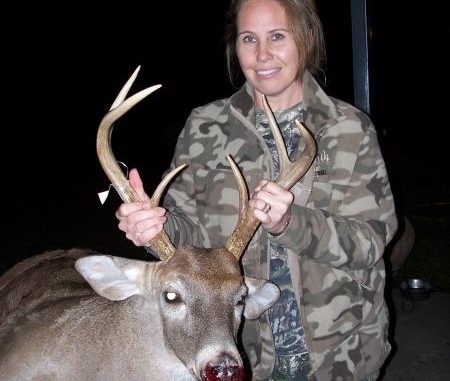
Next event scheduled for April 21
In an effort to encourage the participation of more women in the outdoors, the Louisiana Department of Wildlife and Fisheries has teamed up with Cabela’s to offer a series of workshops dedicated to teaching women the basics of hunting and fishing.
Women are steadily becoming more involved in the outdoor community: With the emergence of camo clothing in women’s sizes, pink guns and “girls only” fishing tournaments, it’s no longer just a man’s world, which is important to bring in fresh faces to grow and promote the outdoor sports.
After attending the Becoming an Outdoors-Woman program that LDWF puts on, Christine Pocorello (retail events and marketing manager of Cabela’s in Gonzales) realized Cabela’s could offer a lot of the same things at their store. She started reaching out to LDWF officials asking if they could teach at the workshops, and it just grew from there.
“As a business, and really Wildlife and Fisheries says the same thing, we need to start educating people on how to become sportsmen and how to pass this heritage,” Pocorello said. “I had an idea that would help benefit our store, they had an idea that would benefit the department, and it just became a perfect marriage.”
The first fishing workshop was held last year, and Pocorello said it was widely successful. A hunting event followed in the fall at the Waddill Outdoor Education Center in Baton Rouge.
Attendees of the hunting workshop were taught how to use shotguns and rifles. They learned how to blood-trail deer, proper deer-stand techniques, the importance of hunting safety and how to clean and cook deer. The ladies were also taught all about the wildlife in the area and which areas are available to the public for free.
Pocorello said they try to keep the group numbers for the workshops around 30 so instructors can have that one-on-one personal time with each attendee and so the ladies can have all their questions answered.
After attending the workshop, a handful of participants are then picked from a lottery drawing to go on either a hunting or fishing trip to utilize what they have learned.
“It’s a full day from 9 to 5, and then we take them out for a full hunting experience,” Pocorello said. “We literally stay from morning to overnight for the hunting, and then when we take you fishing. It’s a whole Friday, Saturday and Sunday excursion.”
Hobo Hunting Club and Ron Bartels with Ducks Unlimited hosted the women for their first hunts this past fall, but Pocorello said the idea is to show these new hunters that there are many WMAs available they can hunt at.
“Last year, because it was a new program to even Wildlife and Fisheries, we actually had to use private land, but the whole idea is this year they’ve actually set aside weekends so we’ll be using Wildlife and Fisheries management areas,” she said.
An April 21 fishing workshop is next on the schedule, and all beginners are welcome to attend these free courses. However, participants must be 17 or older, and able to drive a boat and trailer.
“We’ll be able to take 35 women to Grand Isle in June and teach them how to do inland fishing, wade fishing and gigging for flounders,” Pocorello said.
She added that on that Saturday they had better catch something because they’re cooking it to eat.
Pocorello said information on the workshops will be posted on Cabelas.com: Just click on the Gonzales Events page to find available dates and registration information.
“We actually ask in the registration how much experience you have, and we try to choose the ones that are true novices or did it when they were younger and don’t have the (wealth of) experience,” she said.
In order to keep bring in new people into the sports, guests can only attend both workshops once, but the learning doesn’t have to stop there. Pocorello said they’ll introduce you to a mentoring program through Wildlife and Fisheries so you can continue your learning experience.
“Wildlife and Fisheries has a heritage program,” Pocorello said. “What it does is it connects new hunters or fishermen with experienced hunters and fishermen as mentors.
“So after you do our workshop and you’ve attended the hunt, if you want to go further with more help we put you through the Wildlife and Fisheries heritage program.”


